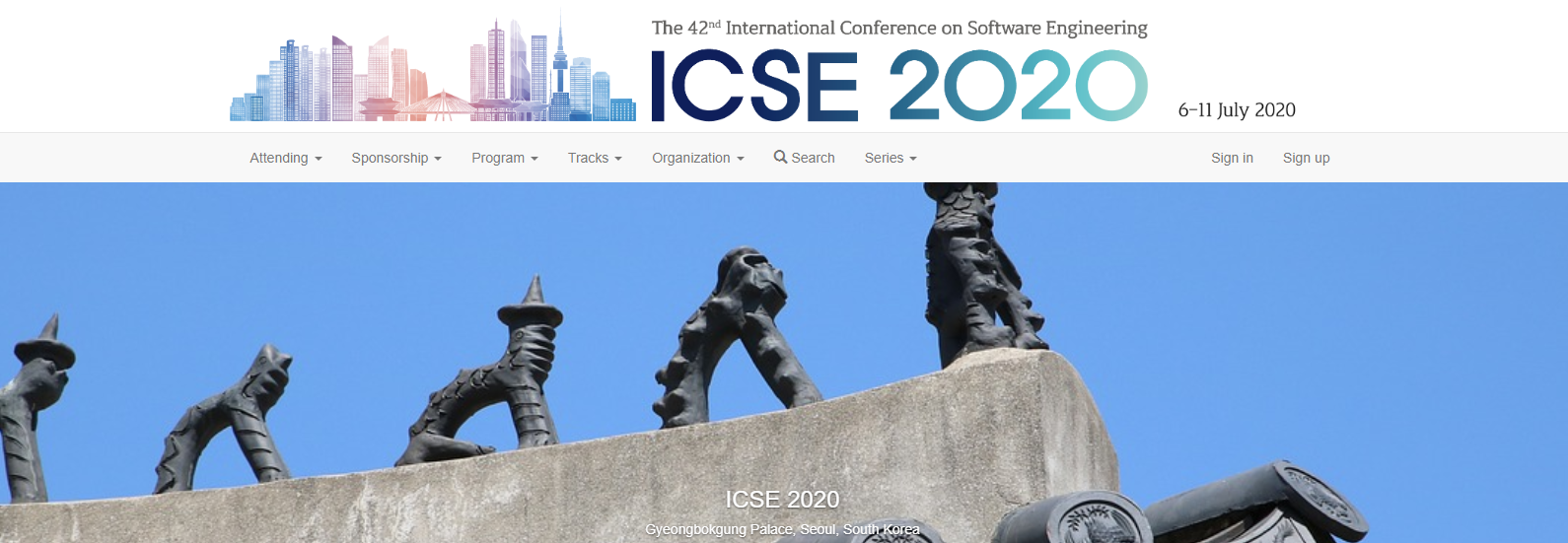The software engineering team of Zhejiang University will make 11 paper presentations at ICSE 2020. The team ranks first in the number of lead authors in the conference, signifying its admirable progress in the field of software engineering. ICSE is a top conference in the field and a Class A international academic conference recommended by the Chinese Computer Federation. This is the 42nd International Conference on Software Engineering, and the conference has been committed to providing the latest and most prominent research progress, experience and direction for researches, educators and practitioners in the field of software engineering. This year, ICSE has accepted a total of 272 technical papers for presentation. The conference will be held online from July 7th to 11th.
The following is the description of the 11 technical papers submitted by the software engineering team of Zhejiang University:
Paper: White-box Fairness Testing through Adversarial Sampling
Track: Technical Track
Authors: Zhang Peixin, Wang Jingyi, Sun Jun, Dong Guoliang, Wang Xinyu, Wang Xingen, Dong Jinsong, Dai Ting
Abstract: In recent years, the public has been concerned about the fairness of deep neural networks. Compared with state-of-the-art methods, this approach employs lightweight procedures like gradient computation and clustering to search for individual discriminatory instances of deep neural network. Compared with existing methods, this approachfinds examples of discrimination more quickly and effectively.
Paper: Demystify Official API Usage Directives with Crowdsourced API Misuse Scenarios, Erroneous Code Examples and Patches
Track: Technical track
Authors: Renxiao Xue, Sun Jiamou, Xing Zhenchang, Xia Xin, Sunjian Ling
Abstract: This paper proposes a text mining method to discover API misuse scenarios from Stack Overflow. This approach extracts erroneous code examples and patches, as well as related API and confusing APIs to construct “demystification” reports to help developers understand the official API usage directives described in natural language.
Paper: Is Using Deep Learning Frameworks Free? Characterizing Technical Debt in Deep Learning Frameworks
Track: Software Engineering In Society
Authors: Liu Jiakun, Huang Qiao, Xia Xin, Emad Shihab, David Lo, Li Shanping
Abstract: This paper uncovers a variety of technical debt in deep learning frameworks by mining 234,260 comments in the source code files of 7 popular deep learning applications.
Paper: Neural Network-based Detection of Self-Admitted Technical Debt: From Performance to Explainability
Track: Journal First Track (ACM Transactions on Software Engineering and Methodology)
Authors: Renxiao Xue, Xing Zhenchang, Xia Xin, David Lo, Wang Xinyu, John Grundy
Abstract: This paper proposes convolutional neural network (CNN) based approach for classifying code comments as SATD (self-admitted technical debt) or non-SATD. To improve the explainability of the model’s prediction results, this approach exploits the computational structure of CNNs to identify key phrases and patterns in code comments that are most relevant to SATD.
Paper: A Large Scale Study of Long-Time Contributor Prediction for GitHub Projects
Track: Journal First Track (IEEE Transactions on Software Engineering)
Authors: Bao Lingfeng, Xia Xin, David Lo, Gail Murphy
Abstract: This paper proposes a multi-dimensional prediction model based on programmers' Github activity data to automatically predict whether new developers in an open source project will become long-term contributors to the project. It also researches important factors that affect new developers becoming long-term contributors, providing guidance for open source projects to retain newcomers.
Paper: How does Machine Learning Change Software Development Practices?
Track: Journal First Track (IEEE Transactions on Software Engineering)
Author: Wan Zhiyuan, Xia Xin, David Lo, Gail Murphy
Abstract: Using a mixture of qualitative and quantitative studies, this approach explores how incorporating machine learning into systems alters software development practices. There is significant difference between the requirements, design, testing and process between non-machine-learning and machine-learning systems.
Paper: What Do Programmers Discuss about Blockchain? A Case Study on the Use of Balanced LDA and the Reference Architecture of a Domain to Capture Online Discussions about Blockchain Platforms across Stack Exchange Communities
Track: Journal First Track (IEEE Transactions on Software Engineering)
Authors: Wan Zhiyuan, Xia Xin, Ahmed E. Hassan
Abstract: This paper proposes an approach that combines balanced LDA with the reference architecture of a domain to capture and compare topics of discussions across the Stack Exchange communities. This approach analyzes and compares the popularity, topic distribution and trends of different reference architecture layers and different blocks for the blockchain related discussions.
Paper: Which Variables Should I Log?
Track: Journal First Track (IEEE Transactions on Software Engineering)
Authors: Liu Zhongxin, Xia Xin, David Lo, Xing Zhenchang, Ahmed E. Hassan, Li Shanping
Abstract: This paper proposes an approach to recommend logging variables for developers during development by learning from existing logging statements. Evaluation results on several large Java projects show that the average MAP of this approach is over 0.84.
Paper: The Impact of Mislabled Changes by SZZ on Just-in-Time Defect Prediction
Track: Journal First Track (IEEE Transactions on Software Engineering)
Authors: Fan Yuanrui, Xia Xin, Daniel Alencar da Costa, David Lo, Ahmed E. Hassan, Li Shanping
Abstract: Just-in-Time defect prediction leverages the SZZ approach to identify bug-introducing changes, but researchers recently found that the performance of SZZ is impacted by many noises. Based on empirical analysis of more than 100,000 changes, researchers discovered that SZZ may considerably mislabel changes that are used to train a defect prediction model, and thus impact the prediction accuracy.
Paper: Characterizing and Identifying Reverted Commits
Track: Journal First Track (Empirical Software Engineering)
Authors: Meng Yan, Xia Xin, David Lo, Ahmed E. Hassan, Li Shanping
Abstract: This paper mainly studies the formation mechanism and prediction method of reverted commits based on 27 commit features and machine learning. It proposes an automated prediction method for reverted commits and its effectiveness has been evaluated on 10 large open source projects.
Paper: What do Programmers Discuss about Deep Learning Frameworks
Track: Journal First Track (Empirical Software Engineering)
Authors: Han Junxiao, Emad Shihab, Wan Zhiyuan, amidst Deng, Xia Xin
Abstract: In order to discover problems users encounter when developing dep learning systems, this paper applies LDA topic modeling techniques to derive the discussion topics related to three popular deep learning frameworks on two platforms by comparing distribution pattern and topic trends.







